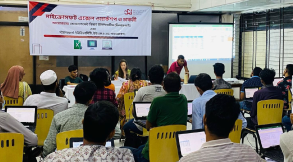The developing economies of India, Kenya and South Africa have witnessed a sharp rise in the value-added share of business services sector over the past decades, which has contributed to economy-wide productivity growth both by drawing labor from low-productivity sectors and by experiencing rapid productivity improvements. However, shortages of adequately skilled workforce in all the three economies act as a major constraint to their sustainable growth. These gaps stem from the fact that the average ICT (Information & Communication Technology) task intensity of jobs in business services is much higher through the intensive use of digital technologies, which have made these services an unlikely destination for low-skilled workers. These barriers are even more acute for women, where a significant proportion of women in these economies are engaged in the low-productive and low-paying agricultural and informal sectors that also grow at slower rates. In light of this, we demonstrate that there is room for supply-side policy intervention to promote inclusive growth and development in these economies by addressing the digital gender divide friction that acts as a constraint to the mobility of female labour force towards business services sector. Accordingly, we identify and draw relevance to suitable channels of policy intervention that address the issue of skill gaps and mismatches amongst the marginalized women workforce, which facilitate in targeting not only the falling female labour force participation and the skilling paradox in ICT-intensive sectors, but also enable the inclusivity in structural transformation process towards the services-led growth in these countries.
Ideas for Transformation (I4T)
• Research Theme 2: Labour, Home Production, and Structural Transformation at the Level of the Household,
Cross-Cutting Issue 1: Gender
The Rise of Business Services and Structural Transformation in India, Kenya and South Africa: Role of Female Labour Supply

Related content














































































